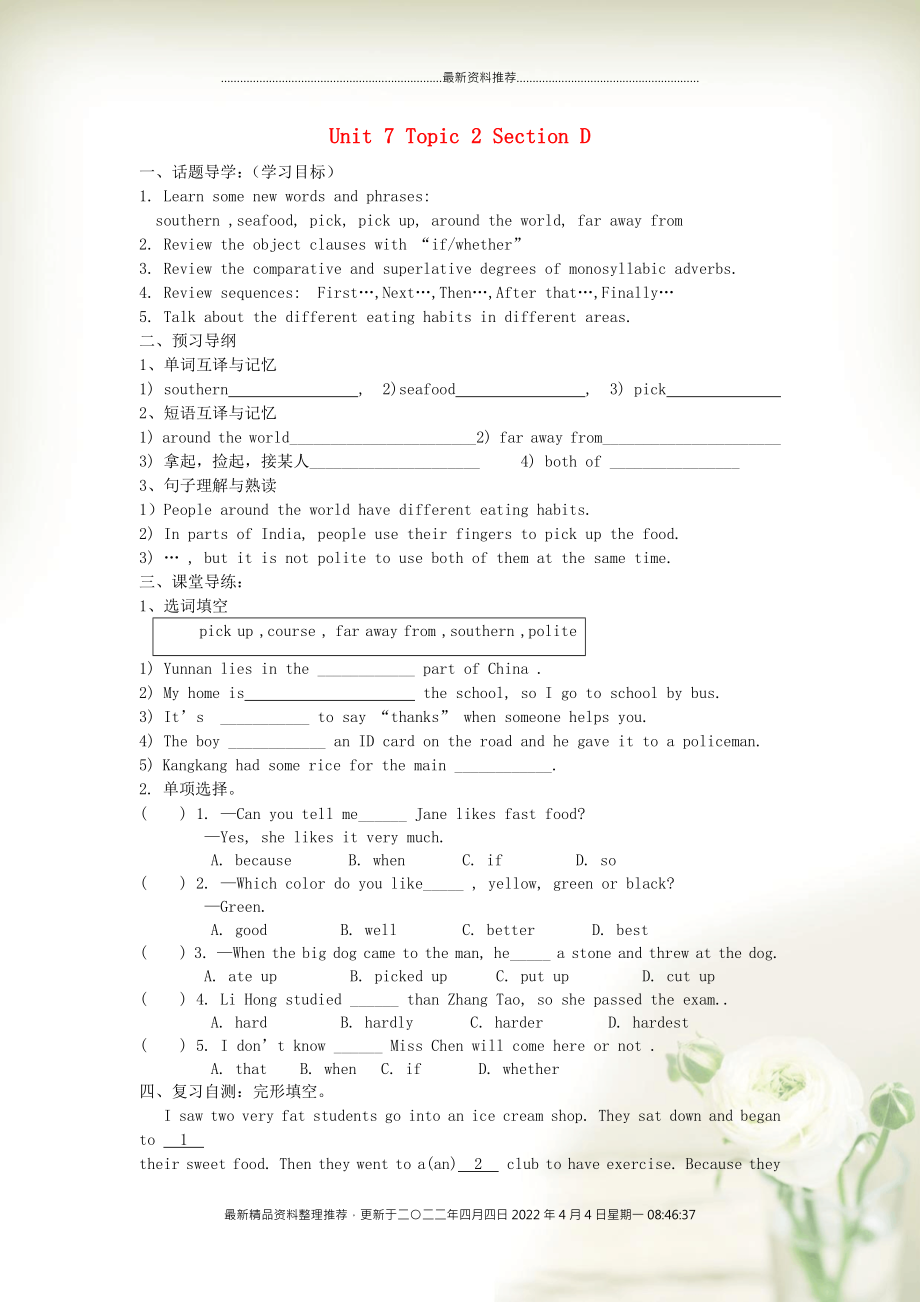《(新新導(dǎo)學(xué)案)廣東省清遠(yuǎn)市八年級(jí)英語(yǔ)下冊(cè) Unit 7 Food festival Topic 2 I’m not sure whether I can cook it well SectionD導(dǎo)學(xué)案 (新版)仁愛版》由會(huì)員分享����,可在線閱讀,更多相關(guān)《(新新導(dǎo)學(xué)案)廣東省清遠(yuǎn)市八年級(jí)英語(yǔ)下冊(cè) Unit 7 Food festival Topic 2 I’m not sure whether I can cook it well SectionD導(dǎo)學(xué)案 (新版)仁愛版(3頁(yè)珍藏版)》請(qǐng)?jiān)谘b配圖網(wǎng)上搜索�����。
1���、……………………………………………………………最新資料推薦…………………………………………………
Unit 7 Topic 2 Section D
一�、話題導(dǎo)學(xué):(學(xué)習(xí)目標(biāo))
1. Learn some new words and phrases:
southern ,seafood, pick, pick up, around the world, far away from
2. Review the object clauses with “if/whether”
3. Review the comparative and superlative degrees of m
2、onosyllabic adverbs.
4. Review sequences: First…,Next…,Then…,After that…,Finally…
5. Talk about the different eating habits in different areas.
二��、預(yù)習(xí)導(dǎo)綱
1�����、單詞互譯與記憶
1) southern , 2)seafood , 3) pick
2�、短語(yǔ)互譯與記憶
1) around the world___________________
3、____2) far away from______________________
3) 拿起�,撿起,接某人_____________________ 4) both of ________________
3�����、句子理解與熟讀
1)People around the world have different eating habits.
2) In parts of India, people use their fingers to pick up the food.
3) … , but it is not polite to use both of them at
4��、the same time.
三����、課堂導(dǎo)練:
1、選詞填空
pick up ,course , far away from ,southern ,polite
1) Yunnan lies in the ____________ part of China .
2) My home is the school, so I go to school by bus.
3) It’s ___________ to say “thanks” when someone helps you.
4) The boy ____________ an
5�、ID card on the road and he gave it to a policeman.
5) Kangkang had some rice for the main ____________.
2. 單項(xiàng)選擇。
( ) 1. —Can you tell me______ Jane likes fast food?
—Yes, she likes it very much.
A. because B. when C. if D. so
( ) 2. —Which color do you like_____ , y
6�����、ellow, green or black?
—Green.
A. good B. well C. better D. best
( ) 3. —When the big dog came to the man, he_____ a stone and threw at the dog.
A. ate up B. picked up C. put up D. cut up
( ) 4. Li Hong studied ______ than Zhang Tao, so
7�����、she passed the exam..
A. hard B. hardly C. harder D. hardest
( ) 5. I don’t know ______ Miss Chen will come here or not .
A. that B. when C. if D. whether
四��、復(fù)習(xí)自測(cè):完形填空���。
I saw two very fat students go into an ice cream shop. They sat down and began to 1
the
8����、ir sweet food. Then they went to a(an) 2 club to have exercise. Because they wanted to be healthy. But they have some 3 habits.
We know that healthy 4 is a way to keep fit. It is very 5 to give our body the energy. The energy should come 6 rice, bread, vegetables and fruit. We
9�、7 need to drink a lot of water, six to eight glasses a day. Now many children eat different kinds of 8 foods. They become fatter and walk 9 than before. They feel tired easily.
In fact, doing sports can also help keep healthy. When we exercise, it can make us 10 . It can even help us sl
10、eep better at night.
In short, we not only need healthy eating but also need exercise.
( ) 1. A. like B. enjoy C. satisfy D. sell
( ) 2. A. health B. English C. music D. food
( ) 3. A. good B. well C. bad D. worse
( ) 4. A. ways B. eating C. drink D. thoughts
( ) 5. A.
11��、difficult B. final C. important D. cheap
( ) 6. A. back B. into C. up D. from
( ) 7. A. hardly B. also C. immediately D. only
( ) 8. A. unhealthy B. same C. regular D. comfortable
( ) 9. A. more slowly B. faster C. most slowly D. fastest
( ) 10. A. slow down B. relax C.
12����、 imagine D. tired
五、課文解讀:
1. In parts of India, people use their fingers to pick up the food.
在印度的一些地方����,人們用手指拿食物吃�����。
“pick up” 意為“拿起�,撿起�����,接某人”�����。如:
The phone rang and I picked it up. 電話鈴響了�����,我那起了話筒
My uncle will pick you up. 我叔叔會(huì)來(lái)接你的����。
2. if和whether引導(dǎo)的賓語(yǔ)從句。
1)if和whether都可引導(dǎo)賓語(yǔ)從句�,意為“是否”。如:
I’m not s
13��、ure if/whether Kate can make biscuits. 我不能確定Kate是否會(huì)做餅干�����。
2)whether可于or not 連用,而if則不能��。如:
She doesn’t know whether or not Jack is in the classroom now.
她不知道Jack現(xiàn)在是不是在教室��。
3. 副詞的比較級(jí)和最高級(jí)
1)表示“一方比另一方做得更……”要用副詞的比較級(jí)����,其結(jié)構(gòu)為“副詞比較級(jí)+than…”�。
如:Kangkang comes to school earlier than Jane.康康比Jane到校早
2)表示“一方在多
14、方中做得最……”時(shí)用副詞的最高級(jí)��,其結(jié)構(gòu)為:
“the + 副詞最高級(jí) + in/of…(比較范圍)”�����,意為“某人或某物在某范圍內(nèi)最……”�,副詞最高級(jí)前可省略the 。如:
Jane did best of the three girls. Jane在三個(gè)女孩中做得最好����。
六、評(píng)價(jià)
內(nèi)容
等級(jí)
自評(píng)
小組長(zhǎng)評(píng)價(jià)
預(yù)習(xí)情況
A
B
C
D
課堂表現(xiàn)
A
B
C
D
小組合作
A
B
C
D
Section D
二�����、預(yù)習(xí)導(dǎo)綱
1、1)南方的�����,南部的 2) 海鮮���,海味 3) 采����,摘����,拾起,挑選
2��、1) 全世界 2)遠(yuǎn)離 3)pick up 4)兩者都
3�、1) 世界各地的人們有不同的飲食習(xí)慣。
2) 在印度的一些地方����,人們用手指拿食物吃。
3) ……但同時(shí)使用兩者是不禮貌的�����。
三、課堂導(dǎo)練:
1����、1) southern 2) far away from 3) polite 4) picked up 5) course
2. 1----5 CDBCD
四、復(fù)習(xí)自測(cè)
1--5 BACBC 6—10 DBAAB
最新精品資料整理推薦�,更新于二〇二二年四月四日2022年4月4日星期一08:46:37
 (新新導(dǎo)學(xué)案)廣東省清遠(yuǎn)市八年級(jí)英語(yǔ)下冊(cè) Unit 7 Food festival Topic 2 I’m not sure whether I can cook it well SectionD導(dǎo)學(xué)案 (新版)仁愛版
(新新導(dǎo)學(xué)案)廣東省清遠(yuǎn)市八年級(jí)英語(yǔ)下冊(cè) Unit 7 Food festival Topic 2 I’m not sure whether I can cook it well SectionD導(dǎo)學(xué)案 (新版)仁愛版

